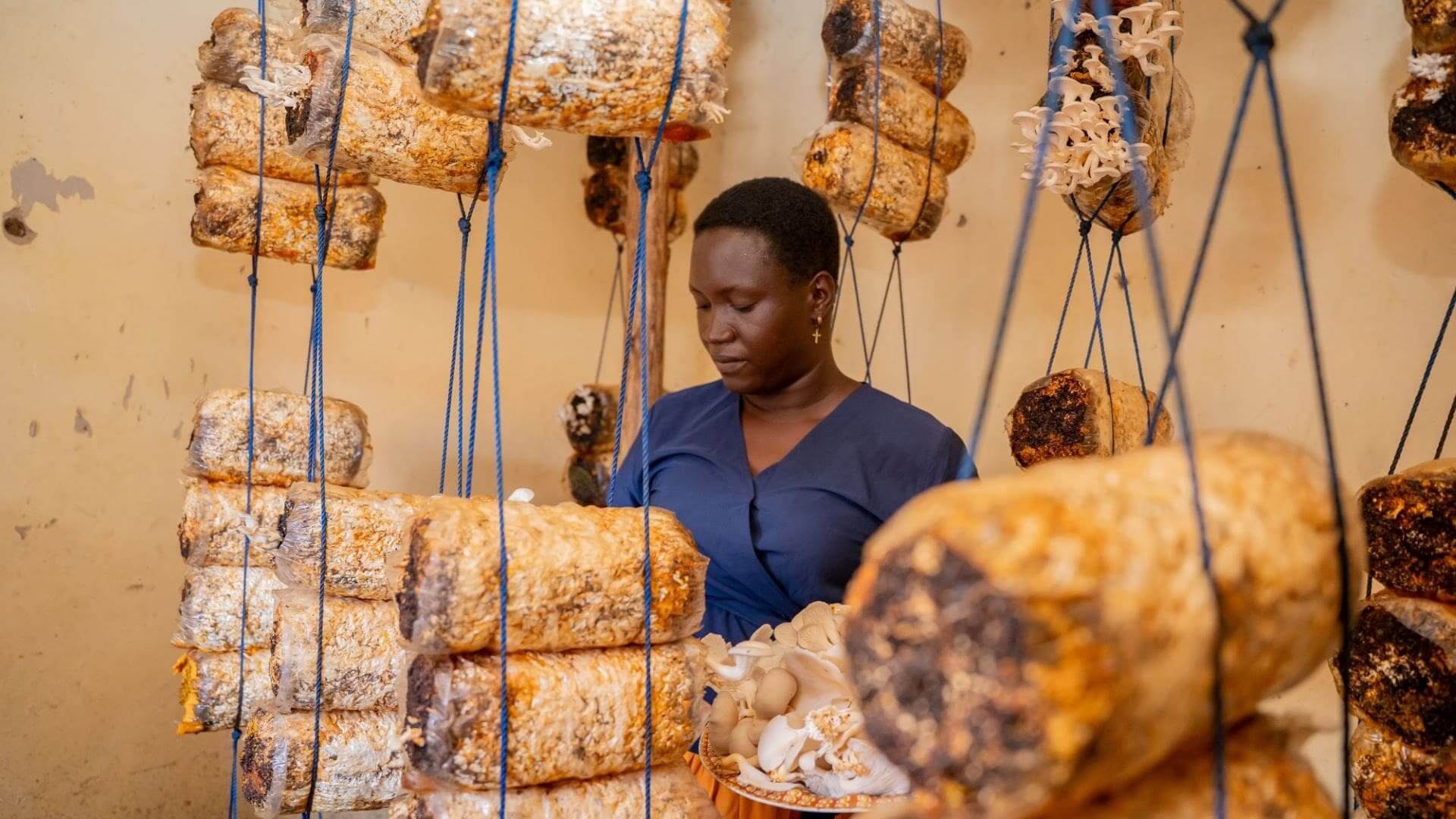Strengthening Urban Refugee Resilience through Climate Smart Livelihoods Initiative in Nairobi and Kampala
Urban refugees and vulnerable host communities in East Africa face increasing climate-related risks, including flooding, heat stress, and environmental degradation, which directly threaten livelihoods and economic stability. Through the Re:BUiLD (Refugees in East Africa: Boosting Urban Innovations for Livelihoods Development) program, the International Rescue Committee (IRC), with support from the IKEA Foundation, is strengthening climate resilience in Kampala, Uganda, and Nairobi, Kenya by integrating climate-smart approaches into urban livelihoods programming.
Working in partnership with city authorities, local businesses, government agencies, community-based organizations, and refugee-led organizations, Re:BUiLD recognizes that improving economic inclusion and building climate resilience must go hand in hand. By promoting green and climate-resilient livelihoods, the program supported refugees and host community members to adapt to climate shocks, reduce environmental harm, and contribute to more sustainable urban economies.
Climate-Resilient Livelihoods in Kampala and Nairobi
In Kampala, Re:BUiLD has worked for over five years in partnership with the Kampala Capital City Authority (KCCA) to enhance refugee integration and service delivery, with a strong focus on access to livelihoods for refugees and vulnerable host communities. Building on this collaboration, Re:BUiLD, KCCA, and the Raising Gabdho Foundation (RGF) have implemented a climate-smart livelihoods initiative that equips participants with skills and resources to engage in environmentally sustainable income-generating activities, while also strengthening refugee inclusion through advocacy, policy engagement, and routine monitoring.
https://nilepost.co.ug/climate-resilient-pathways/197490
In Nairobi, Re:BUiLD operated in refugee-concentrated neighborhoods where climate risks such as flooding, poor waste management, and energy insecurity disproportionately affect low-income residents. The program has supported refugees and host community youth to access climate-resilient livelihood pathways within the green economy, including renewable energy, waste recycling, circular economy enterprises, and climate-smart urban agriculture. These interventions have responded directly to Nairobi’s climate challenges while creating viable employment and self-employment opportunities.
Across both cities, Re:BUiLD has implemented through strong partnerships with city authorities, community-based organizations, and the private sector, ensuring that climate resilience efforts are locally grounded, inclusive, and market-driven.
Sustainable and Green Livelihood Pathways
Re:BUiLD promoted climate-smart livelihood pathways that are environmentally sustainable, economically viable, and accessible to urban refugees and host community members.
In Kampala, the program focused on:
-
Mushroom cultivation, using agricultural waste such as straw and sawdust to produce a high-value, nutritious food product.
-
Black Soldier Fly (BSF) production, which converts organic waste into affordable, high-protein animal feed while reducing waste.
-
Briquette manufacturing, which repurposes biomass waste into cleaner, low-cost cooking fuel alternatives.
These pathways were selected based on the availability of raw materials, low production costs, growing market demand, and affordability for consumers.
In Nairobi, Re:BUiLD prioritized green economy pathways including:
-
Solar energy installation and maintenance, expanding access to clean energy in underserved neighborhoods.
-
Electronic repair and e-waste recycling, turning discarded electronics into income while reducing environmental pollution.
-
Circular economy initiatives, such as textile upcycling, plastic and organic waste recycling, and sustainable urban production.
Together, these pathways demonstrated how climate action can be a driver of employment creation while contributing to cleaner, safer urban environments.
Targeting and Inclusion
Across Kampala and Nairobi, Re:BUiLD intentionally promoted inclusive participation, bringing together refugees and host community members to strengthen social cohesion and shared resilience.
-
In Kampala, the climate-smart livelihoods initiative targeted 500 participants, with 60% refugees and 40% host community members.
-
In Nairobi, Re:BUiLD reached 150 refugees and hosts through green and non-green livelihood services, with strong participation of women and youth.
This inclusive approach ensured that climate resilience efforts benefit entire urban communities, recognizing that climate shocks do not discriminate by status.
Climate Resilience Reach
Across both countries, Re:BUiLD reached a total of 1,008 individuals under the Climate Resilience portfolio:
| Uganda | Kenya | |
| Male | 102 | 187 |
| Female | 48 | 161 |
| Host | 123 | 395 |
| Refugees | 27 | 463 |
Early Results and Climate Resilience Outcomes
In Kampala, early results from climate-smart livelihood groups show promising income potential. Mushroom production groups have recorded cumulative sales of UGX 4,293,300, while briquette production groups are have recorded cumulative sales of UGX 2,083,000 who have gained access local markets, with early weekly sales indicating growing demand for alternative cooking fuels. Ongoing mentorship supports group governance, financial management, and sustainability.
Across the Climate Resilience portfolio, cumulative production and revenue demonstrate the economic viability of climate-smart livelihoods:
| Category | Cumulative Harvest (kg) | Cumulative Revenue (UGX) | Revenue (USD) |
| Mushroom | 596 | 4,293,300 | 1,145 |
| Black Soldier Fly | 35.1 | 140,400 | 37.4 |
| Briquette | 2,911 | 2,083,000 | 555.5 |
In Nairobi, program monitoring shows that a high proportion of participants trained in green livelihood pathways are actively engaged in income-generating activities, either through employment or self-employment. These outcomes reflect the effectiveness of market-driven, climate-resilient livelihood approaches in dense urban settings.
Building Urban Climate Resilience
Through its work in both Kampala and Nairobi, Re:BUiLD demonstrates that climate resilience can be strengthened by linking livelihoods to environmental sustainability. By supporting refugees and host communities to participate in green and climate-smart economic activities, the program reduces vulnerability to climate shocks while positioning urban refugees as active contributors to resilient, inclusive cities.
In the next phase, RE:BUiLD will continue supporting these groups by connecting members to financial services, training opportunities, and ongoing technical assistance, enabling them to grow their income‑generating activities and improve their livelihoods
